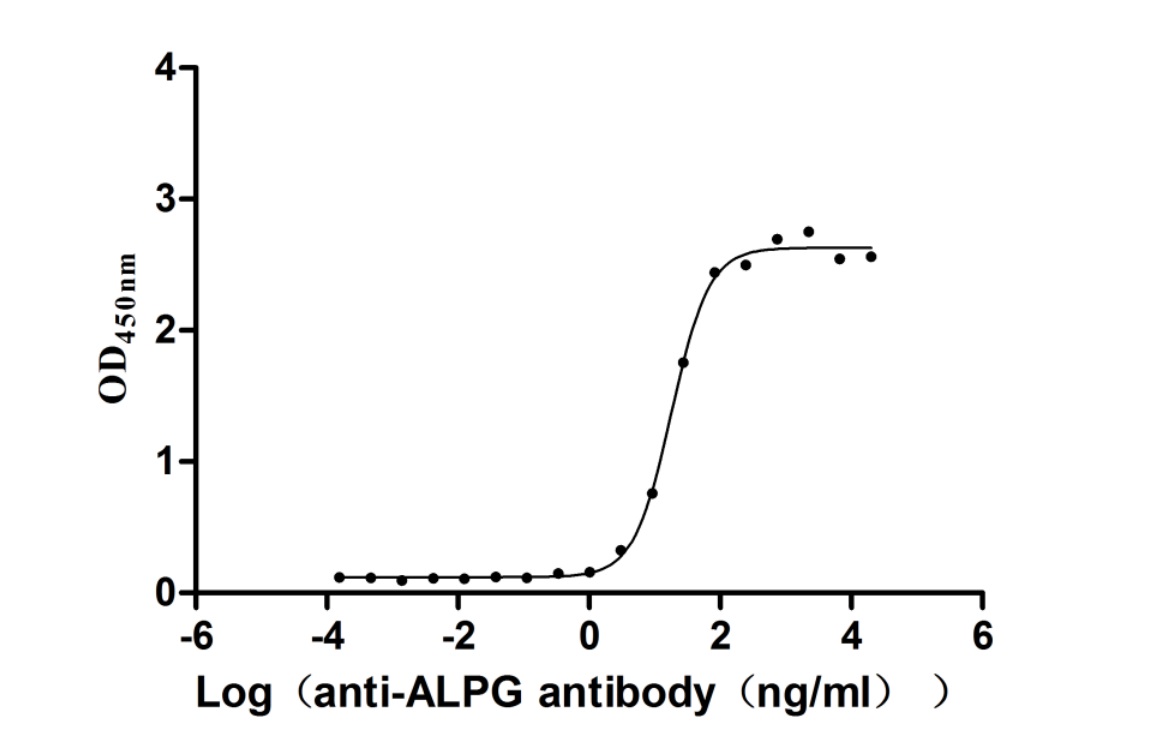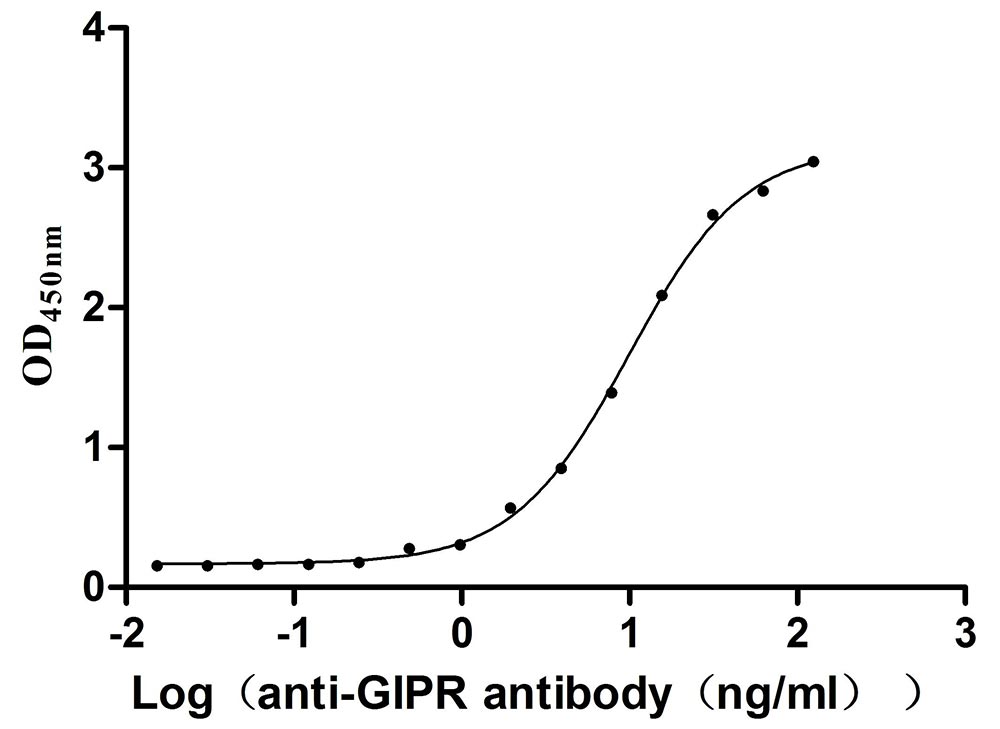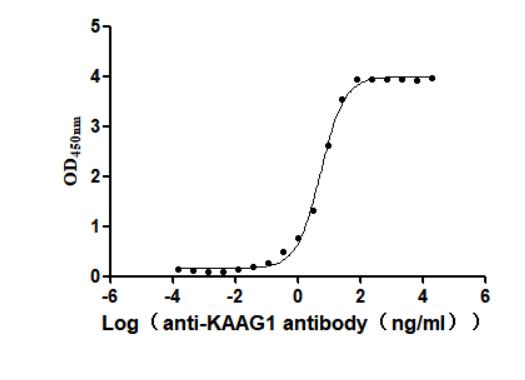Recombinant Mouse Corticotropin-releasing factor receptor 1 (Crhr1), partial
-
货号:CSB-YP005965MO1
-
规格:
-
来源:Yeast
-
其他:
-
货号:CSB-EP005965MO1
-
规格:
-
来源:E.coli
-
其他:
-
货号:CSB-EP005965MO1-B
-
规格:
-
来源:E.coli
-
共轭:Avi-tag Biotinylated
E. coli biotin ligase (BirA) is highly specific in covalently attaching biotin to the 15 amino acid AviTag peptide. This recombinant protein was biotinylated in vivo by AviTag-BirA technology, which method is BriA catalyzes amide linkage between the biotin and the specific lysine of the AviTag.
-
其他:
-
货号:CSB-BP005965MO1
-
规格:
-
来源:Baculovirus
-
其他:
-
货号:CSB-MP005965MO1
-
规格:
-
来源:Mammalian cell
-
其他:
产品详情
-
纯度:>85% (SDS-PAGE)
-
基因名:
-
Uniprot No.:
-
别名:Crhr1; Crhr; Corticotropin-releasing factor receptor 1; CRF-R-1; CRF-R1; CRFR-1; Corticotropin-releasing hormone receptor 1; CRH-R-1; CRH-R1
-
种属:Mus musculus (Mouse)
-
蛋白长度:Partial
-
蛋白标签:Tag type will be determined during the manufacturing process.
The tag type will be determined during production process. If you have specified tag type, please tell us and we will develop the specified tag preferentially. -
产品提供形式:Lyophilized powder
Note: We will preferentially ship the format that we have in stock, however, if you have any special requirement for the format, please remark your requirement when placing the order, we will prepare according to your demand. -
复溶:We recommend that this vial be briefly centrifuged prior to opening to bring the contents to the bottom. Please reconstitute protein in deionized sterile water to a concentration of 0.1-1.0 mg/mL.We recommend to add 5-50% of glycerol (final concentration) and aliquot for long-term storage at -20℃/-80℃. Our default final concentration of glycerol is 50%. Customers could use it as reference.
-
储存条件:Store at -20°C/-80°C upon receipt, aliquoting is necessary for mutiple use. Avoid repeated freeze-thaw cycles.
-
保质期:The shelf life is related to many factors, storage state, buffer ingredients, storage temperature and the stability of the protein itself.
Generally, the shelf life of liquid form is 6 months at -20°C/-80°C. The shelf life of lyophilized form is 12 months at -20°C/-80°C. -
货期:Delivery time may differ from different purchasing way or location, please kindly consult your local distributors for specific delivery time.Note: All of our proteins are default shipped with normal blue ice packs, if you request to ship with dry ice, please communicate with us in advance and extra fees will be charged.
-
注意事项:Repeated freezing and thawing is not recommended. Store working aliquots at 4°C for up to one week.
-
Datasheet :Please contact us to get it.
相关产品
靶点详情
-
功能:G-protein coupled receptor for CRH (corticotropin-releasing factor) and UCN (urocortin). Has high affinity for CRH and UCN. Ligand binding causes a conformation change that triggers signaling via guanine nucleotide-binding proteins (G proteins) and down-stream effectors, such as adenylate cyclase. Promotes the activation of adenylate cyclase, leading to increased intracellular cAMP levels. Inhibits the activity of the calcium channel CACNA1H. Required for normal embryonic development of the adrenal gland and for normal hormonal responses to stress. Plays a role in the response to anxiogenic stimuli.
-
基因功能参考文献:
- Expression of Crhr1 is decreased in the pituitary gland of corticotropin-releasing hormone knock-out mice exposed to repeat stress. PMID: 28993972
- CRF-R1 expression levels were proportional to the severity of DSS-induced colitis. Activation of CRF-R1 aggravated inflammation, and inhibition of CRF-R1 ameliorates inflammation evaluated by the DAI and histological scores in the colon samples of the DSS-treated mice. PMID: 29115460
- report a sexually dimorphic expression of CRFR1 within the rostral portion of the anteroventral periventricular nucleus of the hypothalamus PMID: 28823817
- These results revealed a prominent role for CRF1 signaling in mast cells as a positive modulator of stimuli-induced degranulation. PMID: 28684600
- switch in G protein coupling for type 1 corticotropin-releasing factor receptors promotes excitability in epileptic brains PMID: 27303056
- Study characterized the influences of early-life stress on the developmental trajectory of hippocampal pyramidal neurons, and highlighted the critical role of CRHR1 in modulating these negative outcomes evoked by early-life stress. PMID: 26792004
- the beneficial effects of CRFR1 antagonism seen in transgenic mice may be mechanistically linked to the modulation of oxidative stress pathways PMID: 28750017
- found that corticotropin-releasing factor type 1 receptor within the paraventricular nucleus of the hypothalamus is an important central component of hypothalamic-pituitary-adrenal axis regulation that prepares the organism for successive exposure to stressful stimuli. PMID: 28135239
- Study demonstrated that CRF1 receptor-deficiency prolongs whereas CRF2 receptor-deficiency shortens the duration of recognition memory deficits induced by morphine discontinuation, unraveling opposite roles for the two known CRF receptor subtypes in cognitive dysfunction associated with opiate withdrawal. PMID: 26907806
- CRFR1, in a subset of AgRP neurons, plays a regulatory role that enables appropriate sympathetic nervous system activation and consequently protects the organism from hypothermia and hypoglycemia. PMID: 27211900
- the cyclic AMP (cAMP) response of CRHR1 in physiologically relevant scenarios engages separate cAMP sources, involving the atypical soluble adenylyl cyclase (sAC) in addition to transmembrane adenylyl cyclases (tmACs). PMID: 27402953
- A role was found for extra-hypothalamic CRF-R1 in stress-escalated alcohol drinking. PMID: 26576941
- This study demonstrated that an anatomical mechanism for sex-differences in the convergent modulation of ventrolateral medulla catecholaminergic neurons by CRF and glutamate. PMID: 26306872
- these results indicate that NPS-NPSR system may regulate locomotion together with the CRF1 system in SN. PMID: 26239581
- bladder smooth muscle contractility is unchanged by CsA; however, there are changes in the levels of the downstream transcription factors MEF-2 and NFAT. PMID: 26052002
- The genetic disruption of the CRF1R pathway decreased the period of extinction in males and females suggesting that CRF/CRF1R is implicated in the duration of aversive memory. PMID: 25830629
- Anatomical and biochemical findings demonstrate that accumulation of Abeta is significantly reduced in the brain of Alzheimer's disease model mice lacking CRFR1 providing support for a direct relationship between CRFR1 and Abeta production pathways PMID: 25697705
- Results reveal the influences of early postnatal stress on the development of medial prefrontal cortex (mPFC) pyramidal neurons, and highlights CRF1 as a key molecule in modulating the detrimental stress effects on the structural organizations of mPFC PMID: 25403725
- This study aims to investigate the cellular localization of CRF and UCNs in the ileum and to explore whether and how this cellular expression is altered in conditions of intestinal Schistosoma mansoni-induced inflammation. PMID: 25358399
- NPY and PYY are required for CRF1 modulation of feeding behavior during stress. PMID: 25238483
- The data supports a critical involvement of Crhr1 in environmentally-induced anxiolysis. PMID: 24840018
- Sympathetic activity induced by naloxone-precipitated morphine withdrawal is blocked in genetically engineered mice lacking functional CRF1 receptor PMID: 25582704
- Crhr1 in the basolateral amygdala is critically involved as plasticity gene in the bidirectional epigenetic rescue of extremes in trait anxiety. PMID: 24518397
- CRHR1 has a proinflammatory and therefore a protumorigenesis effect in terms of colitis associated cancer, which may be helpful to develop new therapeutic approaches for inflammation and cancer prevention and treatment PMID: 25015995
- cPLA2 participates in CRHR1-induced apoptosis and CRHR2-inhibited apoptosis. PMID: 24776847
- CRFR1 signaling in the ventral tegmental area presents a target for convergent effects of both cue- and stress-induced cocaine-seeking pathways PMID: 25164654
- data suggest that the gene x stress exposure interaction is based on naturally occurring genetic variations in the Crhr1 gene associated with enhanced CRHR1-mediated signaling. PMID: 24773341
- Leptin regulates corticotropin-releasing factor and urocortin 2/3 mRNA in hypothalamic neurons. PMID: 24083959
- Altered CRF1 receptor-mediated signaling in the ventral tegmental area promotes binge-like alcohol consumption in mice. PMID: 23763790
- Blockade of CRF1 receptors does not exert specific effects on ethanol intake in an animal model of binge drinking. PMID: 23398267
- CRFR1 plays important roles in whole body energy homeostasis PMID: 24054833
- This study demonistrated that Expression of CRFR1 and Glu5R mRNA in different brain areas following repeated testing in mice that differ in habituation behaviour. PMID: 23458743
- ERK1/2 activation in response to CRH is biphasic, involving a first cAMP- and B-Raf-dependent early phase and a second phase that critically depends on CRHR1 internalization and beta-arrestin2. PMID: 23371389
- studies show that SAP97 interactions with CRFR1 attenuate CRFR1 endocytosis and that SAP97 is involved in coupling G protein-coupled receptors to the activation of the ERK1/2 signaling pathway. PMID: 23576434
- the CRH-CRHR1 system interacts with the nectin-afadin complex to mediate the effects of stress on memory and structural plasticity. PMID: 23644483
- CRHR1 agonism stimulates rat and mouse fetal testis steroidogenesis PMID: 23133512
- Reductions in anxiety and corticosteroid levels conferred by heterozygosity of CRF receptor type-1 do not improve a deficit in working memory observed in APP/hAbeta/PS1 mice. PMID: 22336193
- The corticotropin-releasing hormone (CRH) and its type 1 receptor (CRHR1) play a central role in coordinating the endocrine, autonomic, and behavioral responses to stress. PMID: 22886732
- The findings highlight the importance of forebrain CRHR1 in modulating some of the anxiogenic effects of early-life stress. PMID: 22672268
- CRHR1 does not have a role in basal alcohol intake or relapse-like drinking situations with a low stress load. PMID: 22113086
- Data show that CRFR1 and CRFR2 double-KO mice did not exhibit repeated stress-induced alterations in tau-P or solubility. PMID: 22451915
- our data reveal a novel anxiolytic role for CRFR1 in the globus pallidus external. PMID: 22131403
- Data suggest that corticotropin-releasing factor receptor types 1 and 2 mediation of stress-induced hippocampal tau phosphorylation may be limited to emotional stressors. PMID: 21722209
- results suggest that forebrain CRF1 is crucial for the programming of cognitive function by early-life stress. PMID: 21940453
- Present results are suggestive that CRF1 (but not CRF2) receptors play a crucial role in the anxiogenic and antinociceptive effects induced by CRF in the dPAG in mice. PMID: 21723867
- CRH-R1 inhibition is not protective against pneumococcal disease induced by stress. PMID: 21774994
- results define a bidirectional model for the role of CRHR1 in anxiety and suggest that an imbalance between CRHR1-controlled anxiogenic glutamatergic and anxiolytic dopaminergic systems might lead to emotional disorders PMID: 21885734
- forebrain CRHR1 deficiency prevented the down-regulation of hippocampal glucocorticoid receptor expression by chronic stress but induced increased body weight gain during persistent stress exposure. PMID: 21296667
- Data show that stress has opposing effects on CRHR1 and CRHR2 neuronal systems, and suggest that regulation of the relative contribution of the two CRH receptors to brain CRH pathways may be essential in coordinating physiological responses to stress. PMID: 19302188
- This study presented a VSDI assay for the investigation of neuronal activity propagation through the HF and demonstrates that CRH, via CRHR1 PMID: 20619419
显示更多
收起更多
-
亚细胞定位:Cell membrane; Multi-pass membrane protein. Endosome.
-
蛋白家族:G-protein coupled receptor 2 family
-
组织特异性:Detected in brain cortex (at protein level).
-
数据库链接:
KEGG: mmu:12921
STRING: 10090.ENSMUSP00000091455
UniGene: Mm.1892
Most popular with customers
-
Recombinant Human Alkaline phosphatase, germ cell type (ALPG) (Active)
Express system: Mammalian cell
Species: Homo sapiens (Human)
-
Recombinant Mouse Gastric inhibitory polypeptide receptor (Gipr), partial (Active)
Express system: Mammalian cell
Species: Mus musculus (Mouse)
-
Recombinant Human Carcinoembryonic antigen-related cell adhesion molecule 8(CEACAM8) (Active)
Express system: Mammalian cell
Species: Homo sapiens (Human)
-
Recombinant Human Kidney-associated antigen 1(KAAG1) (Active)
Express system: Baculovirus
Species: Homo sapiens (Human)
















